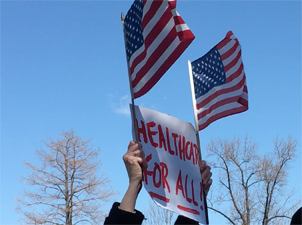
Congress Must Demand the Administration Remove New Pharmaceutical Monopoly Protections from the Text of NAFTA 2.0
Laura Peralta-Schulte
May 10, 2019
Laura Peralta-Schulte, NETWORK Senior Government Relations Advocate, participated in a briefing on Capitol Hill to raise concern for policies included in the Trump administration’s ongoing trade negotiations. Read Laura’s speech below:
Good afternoon. My name is Laura Peralta-Schulte and I am a Senior Government Affairs Advocate for NETWORK Lobby for Catholic Social Justice. NETWORK is a Catholic leader for justice founded over forty years ago by Catholic Sisters and open to all who share our passion. Some of you may know us by our campaign, “Nuns on the Bus.”
People of faith across traditions believe every life has dignity and is sacred. NETWORK Lobby grounds our work in the principles of Catholic Social Justice, which hold that access to healthcare is human right because it is necessary for well-being. The Catholic Sisters and activists of NETWORK reject the notion that only the wealthy should have access to care. Our most sacred texts urge us to “Learn to do good. Seek justice. Help the oppressed.” (Isaiah 1:17)
We acknowledge the genius of scientists who create cures for disease and the role industry plays in our health system. Business is a noble calling if performed in the service of the common good.
Provisions in the current NAFTA 2.0 text, however, are not pro-patient and do not promote the common good. Instead, they prioritize profits over patients.
Powerful companies are attempting to use complicated trade negotiations to lock in current U.S. drug policies and prevent Congress from taking reasonable steps to curb drug price gouging. The new agreement creates new roadblocks for generic companies to compete with brand name products after a patent has expired. It also attempt to export our bad policies to our neighbors.
This is the wrong way forward.
The provisions of the World Trade Organization’s Agreement on Trade-Related Aspects of Intellectual Property Rights (TRIPS), currently in effect in all NAFTA countries, should continue to be the standard in the new NAFTA agreement. TRIPS calls for respect of intellectual property rights, including those for medicines. It also recognizes each nation’s right to take necessary steps to ensure that medicines are available to all of their residents.
We urge your offices to insist that the Administration change the text of the current Agreement to get rid of the following anti-competitive, anti-patient provisions:
First: The current text of NAFTA 2.0 locks in a minimum 10-year marketing exclusivity period for new biologic medicines. (Article 20.49.1). These medicines include many new treatments for cancer, heart disease and even vaccines.
This provision would lock in current rules and stop from Congress from being able to make change.
The faith community has particular concern about how this rule would affect Mexico, where access to medicines for many patients is already simply out of reach. According to the OECD data, seven of every 10 Mexicans live in or near poverty.1 If unchanged, even fewer people will be able to afford needed medicines causing preventable suffering and death.
Second: NAFTA 2.0 expands what drugs get special biologic protections and doubles exclusivity for some medicines. This is in Article 20.49.2. Congress expressly excluded certain drugs from additional monopoly protections. This provision, and others, must be changed to conform to U.S. law.
Third: NAFTA 2.0 extends monopoly protection through “evergreening” provisions. It requires nations to extend patents through minor changes without any increased therapeutic benefits for patients well beyond the original 20-year patent. This is in Article 20.36.2.
Lastly, the agreement requires nations to provide patent term extensions or grant longer protections for perceived administrative delays. This is Article 20.44. This provision would block competition from the marketplace and limit Congress from making changes.
No matter what your position is on trade policy, we believe Congress should establish U.S. healthcare policy, not trade negotiators and industry lobbyists.
We believe each nation has a right to ensure residents have access to life-saving treatments.
At the beginning of his pontificate, Pope Francis wrote a letter were he sharply condemned what he called an “an economy of exclusion.” He wrote, “Just as the commandment “Thou shalt not kill” sets a clear limit in order to safeguard the value of human life, today we also have to say, “thou shalt not” to an economy of exclusion and inequality. Such an economy kills. “
Today, high prescription drug prices force people to choose whether to take the medicines they need, or, instead, to ration or simply go without needed treatments in order to be able pay for other necessities like food and shelter. This is wrong.
Congress must say no to an economy of exclusion and insist the Administration remove these provisions from the current text.
View NETWORK’s Principles of Drug Pricing.







